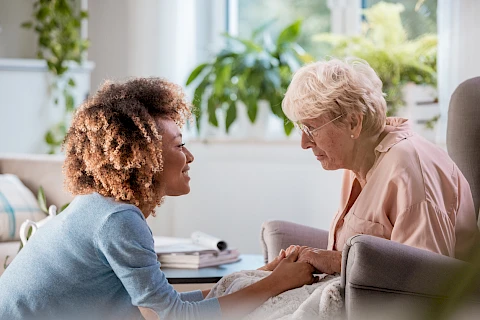
May is Anxiety Awareness Month, a critical time to shed light on a condition that affects millions globally. Anxiety in seniors often goes unnoticed, misunderstood, or dismissed as a normal part of aging. However, it is a real and potentially debilitating condition that necessitates understanding, empathy, and specialized care. Learn how to offer care to seniors with anxiety and ensure they live their golden years with grace, peace, and dignity.
Understanding Anxiety in Seniors
Anxiety in seniors often takes different forms from what is commonly seen in the younger population. It can manifest as excessive worry, sleep disturbances, a change in eating habits, or even unexplained physical symptoms like persistent headaches. Some seniors may experience anxiety due to health issues, medication side effects, or significant life changes, such as losing a spouse or moving away from their home. Regardless of its cause, anxiety can profoundly impact a senior's quality of life, affecting their physical health and overall sense of well-being.
Role of Caregivers in Supporting Seniors with Anxiety
As caregivers, we are crucial in helping seniors manage their anxiety. We are often their first line of support, providing not just physical assistance but emotional and mental support as well. One key point is creating a calm and comforting environment. A familiar setting, a routine, and an overall peaceful atmosphere can provide a sense of safety and predictability, easing anxiety.
Open communication is another integral aspect of care. Encouraging seniors to express their worries or fears allows us to understand their concerns better and offer appropriate assistance. Validating their feelings can reaffirm our support and encourage them to share their experiences more freely.
Tips for Caregivers Supporting Seniors with Anxiety
Are you caring for a senior with anxiety? Here are some tips that can help ease anxiety at home.
Creating a Calm Environment
A peaceful environment can do wonders for a senior dealing with anxiety. This can be as simple as keeping the living space clean and organized or ensuring a good balance of quiet and noise. It may also incorporate soothing elements, such as soft lighting or calming music. A routine can provide a sense of stability and control, which can be beneficial for seniors dealing with anxiety.
Encouraging Open Communication
Encouraging open communication can begin with simple check-ins to understand how the senior is feeling. Listening without judgment, offering comfort, and validating their feelings are essential. Regular, heartfelt conversations can make seniors feel understood and supported, thus alleviating feelings of fear or anxiety.
Accessing Professional Resources
While caregivers can do a lot to support seniors with anxiety, professional help is sometimes necessary. It's crucial to recognize when anxiety becomes too overwhelming and seek assistance from experts. Many resources are available locally, including mental health professionals specializing in senior care. Remember, asking for help is not a sign of weakness; instead, it's a step toward ensuring the best possible care for our seniors.
Do You Need Help Caring for a Senior With Anxiety?
As caregivers, supporting seniors with anxiety can be a complex task. It requires patience, understanding, and a loving touch. This Anxiety Awareness Month, let's strive to create an atmosphere of comfort and openness for our seniors, helping them enjoy their golden years.
If you're in Palm Coast, Bunnell, Flagler, St. Johns, or St. Augustine and need assistance caring for a senior experiencing anxiety, don't hesitate to contact us. Senior Helpers Palm Coast has professionally trained caregivers who are always ready to provide the support your loved one needs.